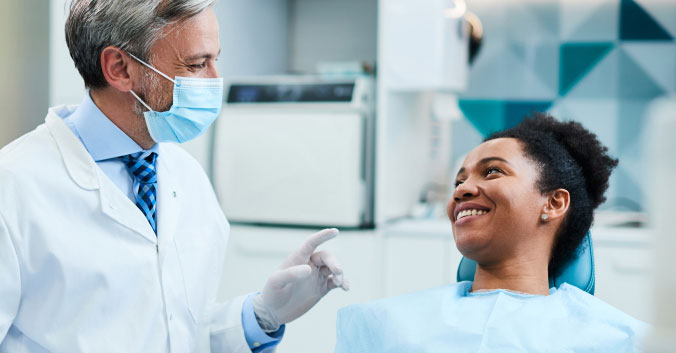
Addressing jawbone density loss in menopausal women: what dentists need to know
Hot flashes. Night sweats. Brain fog. Anxiety. Loss of bone density. For women entering middle age, menopause can bring on a host of physiological and hormonal changes. While many physicians focus on osteoporosis and the risk of bone fractures, an often-overlooked area is the jawbone. In fact, a shocking 84% of women aged 50+ don’t realize how much menopause can affect their oral health.
To better serve patients, dentists need to understand the impact of menopause on jawbone density, why it is important, how to manage its loss, and what to communicate to menopausal patients to help manage it.
Understanding jawbone density loss during menopause
For many women, natural menopause begins between the ages of 45 and 55. During this transitional time, many will experience perimenopause—the period during which menstrual cycles begin to become irregular and eventually stop. When a woman has gone 12 consecutive months without having a period, she has reached menopause. Menopause is characterized by a significant drop in estrogen levels. Estrogen is the hormone that plays a critical role in maintaining a female body’s bone density.
As estrogen levels decline, bone resorption increases, leading to a decrease in bone mass and density. This process doesn’t just affect the larger bones in the body but also the alveolar bone, the part of the jaw that supports teeth.
Loss of jawbone density can lead to several major dental issues, including:
- Increased tooth mobility and loss
- Progressive periodontal disease
- Difficulty fitting dentures or dental implants
Talking to your patients about jaw bone density

Communication is key to helping your patients understand the importance of managing their oral health during menopause. Unfortunately, only 2% of women claim to have discussed menopause with their dentist.
To help them better navigate these major changes, here are some tips to try:
- Avoid complicated medical jargon: When explaining the impact of menopause on jawbone density, use clear, simple language so as not to overwhelm or create unnecessary anxiety or fear in your patients. Understanding what they are facing can help them to better manage or prevent loss.
- Provide up-to-date educational materials: Have helpful information on hand in the form of brochures or websites your patient can access and refer to after their visit. Click here to download more information about menopause.
- Encourage your patient to ask questions: Invite patients to ask questions and express any concerns they may have. Not only does this help create a sense of support, it also creates a sense of ease for your patient.
- Schedule follow-up appointments: Monitor your patient’s progress and adjust care plans as needed. Regular follow-up reinforces the importance of ongoing dental care and helps you monitor your patient’s jawbone density loss.
Your role in managing jawbone density loss with your patients
Because bone density loss can first be measured in the mouth through symptoms like loose teeth, jaw pain, and gum recession, dentists are uniquely positioned to identify and manage jawbone density loss in menopausal patients early on and can provide critical support in managing loss.
Here are key steps you can take to help your patients:
1. Schedule regular comprehensive dental examinations.
Regular dental check-ups should include a thorough examination of the jawbone. Dentists can use radiographs and bone density scans to monitor any changes in the jawbone structure. Early detection of bone density loss can help in planning effective interventions.
2. Educate your patient about bone density loss.
Educating your patients about the impact of menopause on their oral health is vital to managing bone density loss early. You should let your patients know about the connection between declining estrogen levels and bone density loss, emphasizing the importance of regular dental visits and proactive care.
3. Create a personalized dental care plan.
Creating a personalized care plan with your patient can help address their specific needs and help them prevent and manage bone density loss.
Your patient’s plan might include:
- Increasing the frequency of dental cleanings to manage periodontal health
- Use of fluoride treatments to help strengthen teeth
- Consideration of bone-preserving treatments or medications
Bone density loss awareness starts with you
As women navigate the changes brought about by menopause, dentists play a crucial role in maintaining their oral health. By understanding the impact of hormonal changes on jawbone density and implementing proactive care strategies, dentists can help their patients maintain strong, healthy jaws and overall oral well-being. Regular check-ups, patient education, and personalized care plans are key components in addressing jawbone density loss in menopausal women. Download more information about menopause.
Recent posts
- Parent-approved ways to help calm anxious pediatric patients
- Oral health care for seniors: Improving access, improving outcomes
- Simplify your credentialing with CAQH: Check out our webinar recordings
- Updated 2026 CDT codes are here
- View our CDT 2026 Updates webinar and stay on top of code changes
- EFT will become our standard payment method starting 1/1/27
- Start the year strong: Key reminders to support your practice in 2026
- Discover 3 tips to power up your practice with new workflows
- Updated 2026 CDT codes are here
- Partner with us to improve the health outcomes of our shared members
